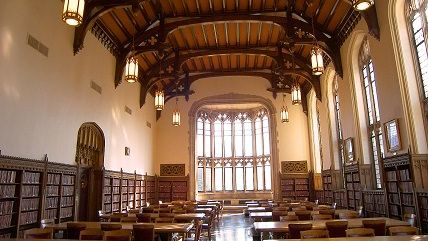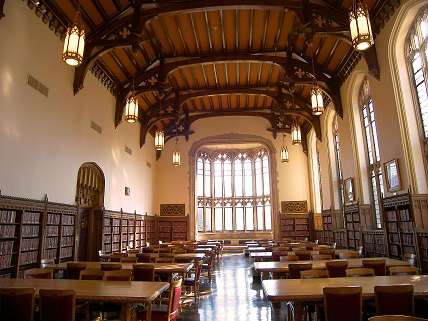Frat Brothers Make Execrable Racist Statements, America Forgets First Amendment
A school is exactly the kind of place where evil views should do battle with moral and logical views.


Outrage over racist chanting at a Sigma Alpha Epsilon event at the University of Oklahoma is spilling over to other campuses, prompting concerns about systemic racism at that fraternal organization and within college Greek life as a whole. At the same time, lots of people who should know better—who purport be legal scholars, even—seem to have forgotten that offensive speech is protected under the First Amendment to the U.S. Constitution.
Higher education reporters are now hard at work digging up every instance of racial insensitivity perpetrated by any SAE chapter. The full list, which contains 8 occurrences stretching back to 1981, is actually shorter than one might have expected.
Still, many members of the OU community, activist groups, students at other campuses, some former SAE brothers, and national commentators are all saying that this fraternity—and possibly its national organization—have allowed a culture of lingering racism to fester. And although it's difficult to tell how widespread that problem is, I think it's fair to say the videos demonstrate the complicity, to some degree, of a significant number of people in the fraternity.
So while the problem shouldn't be overstated—it should not be construed as evidence that racism is worsening, for instance—it shouldn't be minimized, either. There is something pernicious in the fabric of this organization. The university community is justified in wanting to have some kind of dialogue about racism, show of support for racial equality, or educational campaign about the history of racism in America and its modern descendants.
Unfortunately, University President David Boren has done every single wrong thing imaginable. Expelling the students for offensive but constitutionally-protected statements without so much as a hearing is a violation of the school's own policies, to say nothing of the Bill of Rights. His rash and brazenly unconstitutional actions have probably birthed a free speech and due process fight with serious implications for students' rights. That's definitely not in the best interests of efforts to confront racism on campus, because now the college has to reckon with its own illegal policies as well as its students' racial insensitivity.
Even if the students don't contest the expulsions—at least one has already decided to withdraw from the university—Boren's decision will have a chilling effect on the campus speech climate. Students will internalize the lesson that they have no legal protections if they run afoul of the administration.
Despite all this, many have hailed Boren's actions, and many who should know better have turned a blind eye to obvious illegality.
Joey Jackson, HLN's resident "legal expert," responded to concerns raised by the Foundation for Individual Rights in Education, The Washington Post's Eugene Volokh, and me by opining, "Hate speech is not protected by the Constitution as it has no social value."* (This is false, of course; hateful speech is fully protected, except under circumstances that don't seem to apply here—i.e., the speech was likely to provoke a fight, or could reasonably be construed as a threat of violence.)
At one of the Gawker sites, Elie Mystal criticized Volokh in unkind terms for going "all old white man on us" and refusing to recognize the chant as a call to violence. "Now, I get how a white listener wouldn't take the threat as a true threat. They weren't threatening Eugene Volokh," Mystal wrote. "Yes, the lynching song was a 'true threat.' The fact that I have to argue about it makes it all the more terrifying." (But it wasn't a true threat, because it lacked any of the specifics necessary for it to rise to the legal definition of a true threat. Sometimes white people are right, in spite of their skin color.)
And the American Civil Liberties Union, shockingly, has failed to denounce OU, instead patting the university on the back for how it's handling the situation. (That's disappointing.)
Even if expelling students for expressing racist views were constitutionally permissible (and again, it's not), it would not be the smart course of action. Slate's Jamelle Bouie explains why:
As far as the University of Oklahoma is concerned, I should say I'm not thrilled with the punishment. Disbanding the fraternity might be justified, but expelling students for hate speech is an extreme response that runs afoul of free-speech norms, if not the First Amendment.
Education would be better. The University of Oklahoma is two hours away from Tulsa, which in 1921 was the site of one of the worst anti-black race riots in American history. More than a thousand whites stormed the black district of Tulsa and razed it to the ground, killing hundreds and leaving thousands homeless and destitute. Black Tulsa never recovered, but memories of the attack live on among descendants of the victims.
Don't expel the boys. Bring them to Tulsa. Have them see the memorials and talk to the children of survivors. Give them a chance to see what their words actually mean, and whether they want to be the kinds of people who sing about lynching for fun.
A school is exactly the kind of place where evil views should do battle with moral and logical views, and lose. We have everything to gain by confronting racism head-on in the intellectual setting that a university purportedly provides, and a lot to lose by trampling students' rights in a misguided rush to do the opposite.
*UPDATE: The HLN article appears to have been altered. Jackson is now quoted as saying, "Hate speech is protected by the Constitution despite its limited social value. If the speech is chanted in a confined environment, as here, amongst people of a similar mindset, it may be vulgar and distasteful, but it's remains protected. If, however, the chant if re-broadcast or otherwise directed toward African Americans, then -- to the extent that it may have the tendency to become so inflammatory as to incite violence or otherwise encourage imminent lawless action, then such speech may well lose its constitutional protection." This change is unacknowledged in the post, as far as I can tell.


Show Comments (430)